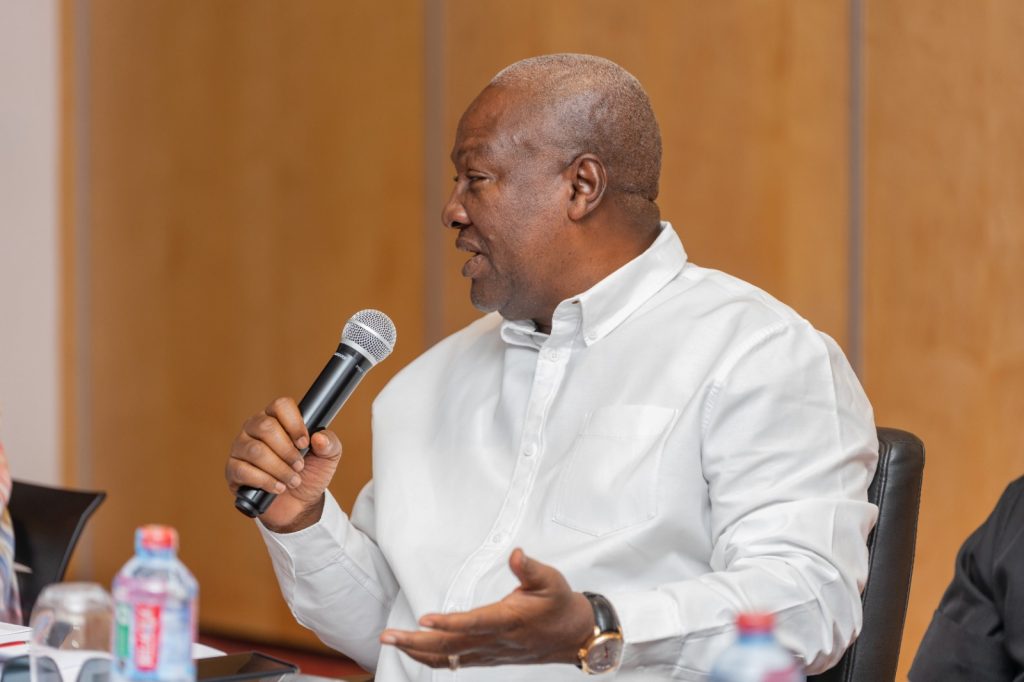At the 3rd Annual Transformational Dialogue on Small-Scale Mining in Sunyani, former President John Mahama emphasized the critical need to include traditional leaders in the process of granting mining licenses. His address underscored the importance of promoting inclusivity and respect for all stakeholders in Ghana’s mining sector.
Acknowledging the Contributions and Challenges of Mining
Mahama began by recognizing the significant role that mining has played in Ghana’s economy. However, he did not shy away from addressing the pressing issue of illegal mining, often referred to as “galamsey,” which has wreaked havoc on the environment, health, and local economies. The devastating impact of illegal mining activities, including the pollution of rivers, destruction of forests, and degradation of fertile lands, cannot be ignored.
The former president highlighted the urgency of implementing sustainable development and responsible mining practices to curb the adverse effects of illegal mining. He cited examples from both local and international contexts, stressing the need for stringent enforcement of mining laws and regulations.
A Multifaceted Approach to Sustainable Mining
Mahama proposed a multifaceted approach to address the challenges in the mining sector. Key among his proposals was the establishment of district mining offices in all mining areas, staffed by officers from the Minerals Commission, the Environmental Protection Agency (EPA), and other relevant agencies. This initiative aims to streamline the application process for mining licenses, enhancing transparency and efficiency.
In a significant move to decentralize the licensing regime, Mahama suggested amending the Minerals and Mining Act to grant district mining offices the legal mandate to issue mining licenses. This, he argued, would increase the number of regulated small-scale mining companies and boost youth employment, particularly under the proposed 24-hour economy policy.
Inclusion of Traditional Leaders: A Testament to Respect and Inclusivity
A crucial element of Mahama’s vision for the mining sector is the inclusion of traditional leaders in the licensing process. By involving these community figures, the government can ensure that the granting of mining licenses is done with the full consultation and consent of local communities. This move not only promotes inclusivity but also respects the cultural and societal structures that have long been part of Ghana’s heritage.
Traditional leaders play a vital role in their communities, and their involvement in the mining sector can foster greater accountability and transparency. By working together with these leaders, the government can ensure that mining activities are conducted in a manner that benefits the entire community, rather than a select few.
Structural Reforms and Technological Innovation
Mahama also outlined plans for structural reforms within the mining sector. He proposed re-categorizing mining operations into Small-Scale (SSM), Medium-Scale (MSM), and Large-Scale (LSM) to tailor operational, environmental, and safety requirements more effectively. This re-categorization would facilitate better regulation and support for miners, enhancing access to legal mining sites, fair markets, and financial services.
Emphasizing the role of technology, Mahama suggested using artificial intelligence (AI) to monitor small-scale mining operations, track excavators, and geo-fence concessions to ensure compliance with approved mining areas. This technological innovation aims to reduce the environmental impact of mining activities and encourage legal mining practices.
Commitment to Environmental Restoration and Job Creation
Recognizing the legacy scars left by illegal mining activities, Mahama proposed several initiatives to restore degraded lands and rehabilitate impacted forests. These initiatives, including a National Joint Action Team on Mining and Forestry and a Galamsey Rehabilitation Initiative, aim to convert affected lands into commercial crop production zones and create thousands of jobs in mining communities.
Additionally, Mahama announced the launch of the Ghana Mining Excellence Centre (GMEC) to promote research and innovation in responsible mining practices. The GMEC will collaborate with scientists from global universities to stimulate green growth within Ghana’s mining industry.
Fostering Dialogue and Building a Sustainable Future
In his concluding remarks, Mahama urged all stakeholders to engage in open, honest, and inclusive dialogue. He emphasized that lasting solutions to the challenges in the mining sector can only be achieved through collective action and cooperation. By fostering dialogue among miners, environmental groups, local communities, and the government, Ghana can build a sustainable, responsible, and prosperous small-scale mining sector.
Mahama’s vision for the future of Ghana’s mining industry is clear: a sector that prioritizes sustainable development, respects the environment, and includes all stakeholders in its governance. His commitment to working with traditional leaders, regulatory bodies, and the community at large sets a solid foundation for achieving this vision and building the Ghana we all aspire to see.

